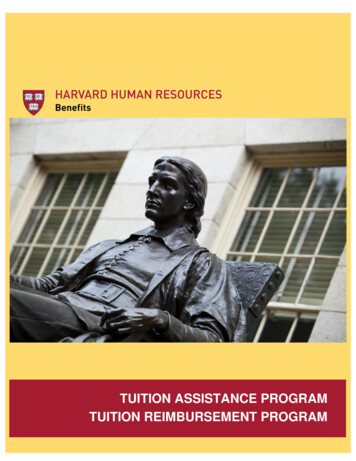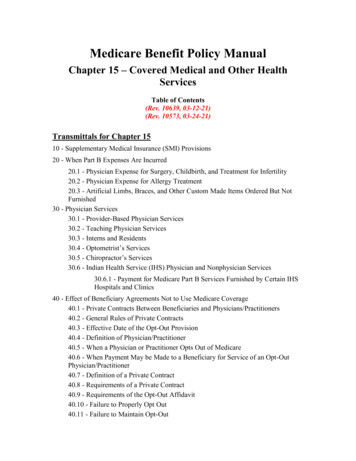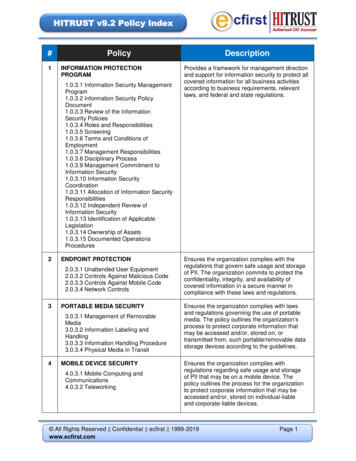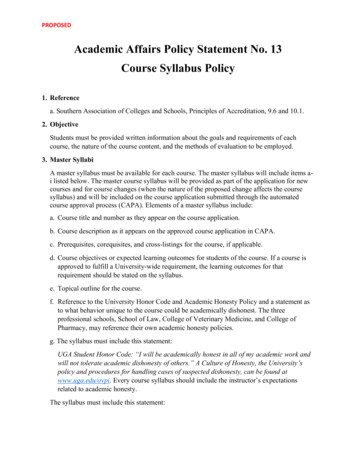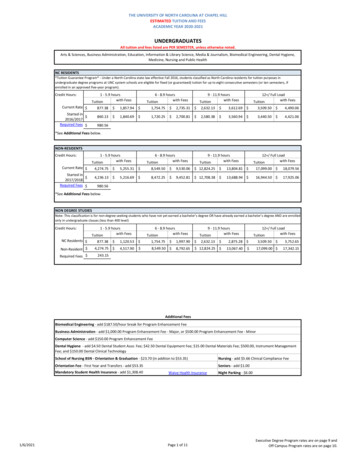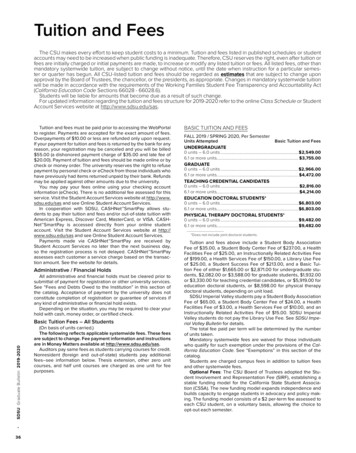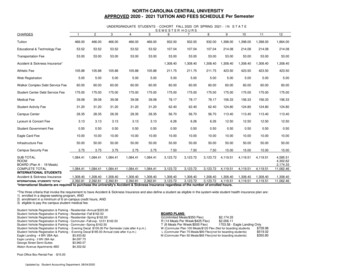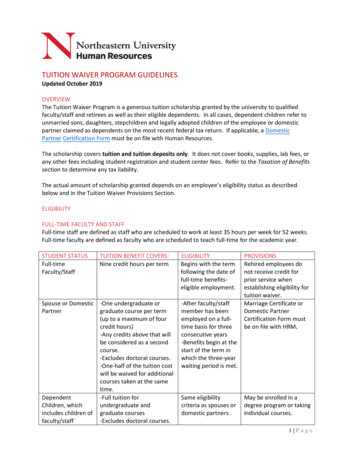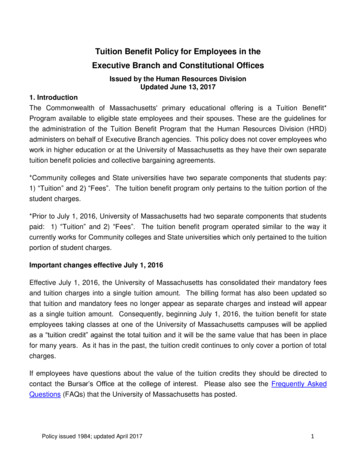
Transcription
Tuition Benefit Policy for Employees in theExecutive Branch and Constitutional OfficesIssued by the Human Resources DivisionUpdated June 13, 20171. IntroductionThe Commonwealth of Massachusetts' primary educational offering is a Tuition Benefit*Program available to eligible state employees and their spouses. These are the guidelines forthe administration of the Tuition Benefit Program that the Human Resources Division (HRD)administers on behalf of Executive Branch agencies. This policy does not cover employees whowork in higher education or at the University of Massachusetts as they have their own separatetuition benefit policies and collective bargaining agreements.*Community colleges and State universities have two separate components that students pay:1) “Tuition” and 2) “Fees”. The tuition benefit program only pertains to the tuition portion of thestudent charges.*Prior to July 1, 2016, University of Massachusetts had two separate components that studentspaid: 1) “Tuition” and 2) “Fees”. The tuition benefit program operated similar to the way itcurrently works for Community colleges and State universities which only pertained to the tuitionportion of student charges.Important changes effective July 1, 2016Effective July 1, 2016, the University of Massachusetts has consolidated their mandatory feesand tuition charges into a single tuition amount. The billing format has also been updated sothat tuition and mandatory fees no longer appear as separate charges and instead will appearas a single tuition amount. Consequently, beginning July 1, 2016, the tuition benefit for stateemployees taking classes at one of the University of Massachusetts campuses will be appliedas a “tuition credit” against the total tuition and it will be the same value that has been in placefor many years. As it has in the past, the tuition credit continues to only cover a portion of totalcharges.If employees have questions about the value of the tuition credits they should be directed tocontact the Bursar’s Office at the college of interest. Please also see the Frequently AskedQuestions (FAQs) that the University of Massachusetts has posted.Policy issued 1984; updated April 20171
2. EligibilityThe Tuition Benefit is available to regular full-time state employees and their spouses if theemployee has at least six months of full-time service with the Commonwealth. Prior part-timeservice can be counted towards the six month requirement on a pro-rated basis as long as theemployee is currently working full-time. . In case of a break in service, regular full-time stateemployees will be credited with previous service as long as the break has been less than three(3) years.Contract employees and their spouses are not eligible for tuition benefits.Retired state employees and their spouses are not eligible for tuition benefits.An employee's eligibility can be verified in HR/CMS by viewing the Employment Dates page injob data. The service date field is the employee's state service date.3. BenefitsCommunity Colleges and State Universities:100% tuition benefit shall apply to enrollment in a traditional day course or program at theundergraduate or graduate level only at Public Community Colleges or State Colleges. 50%tuition benefit shall apply to enrollment in a course or program offered through continuingeducation only at Public Community Colleges or State Colleges.University of Massachusetts:A tuition credit, valued at the amounts listed below, shall apply to enrollment in a traditional daycourse or program at the undergraduate or graduate level at University of MassachusettsCampuses (excluding the MD program at the University of Massachusetts Medical School andthe Law School at the University of Massachusetts Dartmouth).The maximum value of the full-time undergraduate tuition credit per academic year at eachcampus is as follows (the value will be prorated if attending on a part-time basis): Amherst 1,714; Boston 1,714; Dartmouth 1,417; Lowell 1,454.The maximum value of the full-time graduate tuition credit per academic year at each campus isas follows (the value will be prorated if attending on a part-time basis): Amherst 2,640;Boston 2,590; Dartmouth 2,071; Lowell 1,637.Policy issued 1984; updated April 20172
A 50% of tuition credit shall apply to enrollment in a continuing education program at theUniversity of Massachusetts campuses (excluding the MD program at the University ofMassachusetts Medical School and the University of Massachusetts Dartmouth Law School) asdefined by the institutions.The tuition benefit for online courses at one of the University of Massachusetts campuses is atthe discretion of each campus; questions regarding the online courses should be directed toeach campus.Employees should check with the Bursar's Office to determine if a program or course is eligibleunder the tuition benefit program and, if so, the value of the benefit.4. LimitationsEligible employees must use this benefit on their own time and at no cost to the state agency.Agency heads are encouraged to allow all eligible staff to use flex-time, part-time, vacation orpersonal time to accommodate staff participation in courses covered by the tuition benefit.Admission to all programs is on a space available basis. Spousal eligibility is subordinate to thetuition benefit rights extended to full-time state employees.Employees and spouses of employees must apply for admission and meet all the regularadmissions standards and criteria for the desired course/program they wish to attend.Since most programs of continuing education at community colleges, state colleges anduniversities are self-sustaining, each local campus administration reserves the right to cancelany continuing education course in which a minimum number of full tuition paying students hasnot enrolled.Employees and their spouses who use this tuition benefit are responsible for all other tuition andfees charged by the college or university.5. AdministrationHRD administers this program for Executive Branch agencies for eligible state employees andtheir spouses as follows: Managerial and confidential employees in the Executive Branch All non-union employees of Constitutional Offices (Governor, Lieutenant Governor, Secretaryof State, Attorney General, State Auditor, State Treasurer)Policy issued 1984; updated April 20173
Employees in the Executive Branch and the Attorney General's Office covered by collectivebargaining agreementsThe Employee Service Center (ESC) at HRD handles all tuition benefit forms (online via aneForm) for agencies which participate in ESC. Please see this page for more rvice-center/All other state agencies process tuition forms for their employees. Employees in these agenciesshould consult their Human Resources Director for applicable Tuition Benefit policies andprocedures. The Human Resources Director is usually the Signatory Authority for the agency.6. Application ProcedureEmployees must complete a Tuition Benefit Certificate and submit to the ESC (online via aneForm) for agencies which participate in ESC. All other employees submit the Tuition BenefitCertificate to their Human Resources Department for verification of employment. If the benefit isbeing used by an eligible employee's spouse, the employee must also submit proof of marriagesuch as a Marriage Certificate.It is the employee's responsibility to submit the form allowing sufficient time for its processing.Colleges do not allow retroactive tuition benefit certificates. They must be submitted accordingto the institution's regulations (usually at the time of registration for the course or program).Once eligibility is verified, the Agency Head or his/her designee must sign the certificate. Theform is then returned to the employee who submits the certificate with their tuition bill, or at thetime of registration with the school.This certificate is valid for 120 days from the date of issue. A new certificate is required for eachacademic semester.7. Record KeepingEmployees and agencies are to keep copies of Tuition Benefit Certificates.8. Audit ProcessThe Tuition Benefit Program is administered by HRD for Executive Branch agencies to ensurethat the Tuition benefit is provided only to eligible employees and/or their spouses according tothese guidelines.Policy issued 1984; updated April 20174
If an employee granted the benefit is found to be non-eligible, the agency will notify theemployee and the college/university attended that the employee must reimburse the school forthe cost of the tuition credit. Until this requirement is met, the employee will not be eligible foradditional Tuition benefits.9. InstitutionsClick on the following website links to learn more about programs and courses at the publicCommunity Colleges, State University campuses, and the University of Massachusetts.Public Higher Education CampusesLocationWebsiteBoard of Higher EducationBostonhttp://www.mass.edu/Berkshire Community CollegePittsfieldhttp://www.berkshirecc.edu/Bunker Hill Community CollegeCharlestownhttp://www.bhcc.mass.eduBristol Community CollegeFall Riverhttp://www.bristol.mass.edu/Cape Cod Community CollegeBarnstablehttp://www.capecod.edu/Greenfield Community CollegeGreenfieldhttp://www.gcc.mass.edu/Holyoke Community CollegeHolyokehttp://www.hcc.edu/Massachusetts Bay Community College Wellesleyhttp://www.massbay.edu/Massasoit Community esex Community CollegeBedfordhttps://www.middlesex.mass.edu/Mount Wachusett Community CollegeGardnerhttp://www.mwcc.mass.edu/Northern Essex Community CollegeHaverhillhttp://www.necc.mass.edu/North Shore Community d Community CollegeWorcesterhttp://www.qcc.edu/Policy issued 1984; updated April 20175
Public Higher Education CampusesLocationWebsiteRoxbury Community CollegeRoxburyhttp://www.rcc.mass.edu/Springfield Community CollegeSpringfieldhttp://www.stcc.edu/Bridgewater State urg State ramingham State achusetts College of Art s College of Liberal ArtsNorth Adams http://www.mcla.edu/Massachusetts Maritime AcademyBuzzard Bayhttp://www.maritime.edu/Salem State UniversitySalemhttp://www.salemstate.edu/Westfield State cester State sity of Massachusetts w.umb.edu/Maximum full-time tuition credit peracademic year which will be prorated ifattending on a part-time basis is:Undergraduate: 1,714Graduate: 2,640University of Massachusetts BostonMaximum full-time tuition credit peracademic year which will be prorated ifattending on a part-time basis is:Undergraduate: 1,714Graduate: 2,590Policy issued 1984; updated April 20176
Public Higher Education CampusesLocationWebsiteUniversity of Massachusetts du/(Law School is not eligible for the tuitionbenefit program)Maximum full-time tuition credit peracademic year which will be prorated ifattending on a part-time basis is:Undergraduate: 1,417Graduate: 2,071University of Massachusetts LowellMaximum full-time tuition credit peracademic year which will be prorated ifattending on a part-time basis is:Undergraduate: 1,454Graduate: 1,637University of Massachusetts MedicalSchool (MD program is not eligible fortuition benefit program)For current tuition credit amounts,contact the Bursar’s Office at dents/tuition-and-fees/Document HistoryTable 1: Document HistoryDate IssuedActionEffective DateNext Review Date(Version Change)1984Original policy issued1984n/a1997Revised policy issued; tuitionbenefit extended to spouses1997n/aPolicy issued 1984; updated April 20177
Date IssuedActionEffective DateNext Review Date(Version Change)12/6/2002Revised policy issued; formapproval is delegated12/20/2002n/a3/2/2011Revised policy issued3/2/2011n/a2/11/2015Revised policy issued; MassHREmployee Service Center approvaladded for participating agencies2/11/2015n/a4/18/2017Updated information on UMassbilling system and tuition benefits4/18/20174/18/20186/13/2017Clarified undergraduate andgraduate academic year limits ontuition credit6/13/176/13/18Policy issued 1984; updated April 20178
Jun 13, 2017 · The tuition benefit for online courses at one of the University of Massachusetts campuses is at the discretion of each campus; questions regarding the online courses should be directed to each campus. Employees should check with the Bursar's Office to determine if a program or course is eligible
